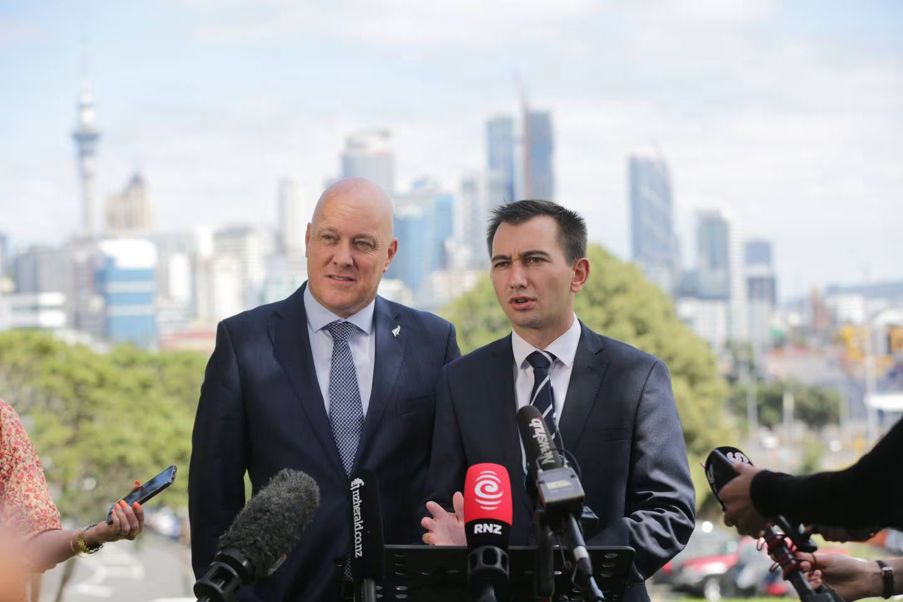The Auckland regional fuel tax is ending, Prime Minister Christopher Luxon and Transport Minister Simeon Brown have announced.
The pair made the announcement in Auckland’s central suburb of Parnell this afternoon, saying the tax was not being used to fund projects that met the Government’s and mayor Wayne Brown’s transport priorities.
The tax is due to come to an end by June 30. Brown said legislation would be introduced to Parliament to repeal the tax as part of the coalition Government’s 100-Day Plan.
“Since 1 July 2018, Aucklanders have faced an additional 11.5 cents per litre tax on fuel, over and above what the rest of the country pays, increasing the cost of living at a time when they can least afford it. Ending this tax is one way to reduce the price of fuel and ease some of the financial pressure facing households in our largest city,” he said.
“Removing this extra tax of 11.5 cents per litre on petrol and diesel means the driver of a Toyota Hilux will save around $9.20 every time they fill up, while a Toyota Corolla driver will save around $5.75.
“Fuel tax is becoming an increasingly regressive form of taxation and costs people on lower incomes with less fuel-efficient vehicles more than those who have newer more fuel-efficient vehicles. We intend to fully remove the legislative framework for regional fuel taxes.”
However, Auckland mayor Wayne Brown has expressed concern that Aucklanders will miss out on major road and public transport improvements because of the fuel tax cancellation.
He acknowledged the National Party campaigned to repeal it, but this decision will have unintended consequences unless the Government is prepared to foot the bill for upcoming transport projects.
“[The cancellation] will leave a shortfall in transport funding for Auckland of $1.2 billion over the next four years. Furthermore, the loss in revenue will mean that Auckland Council’s debt-to-revenue ratio will increase, meaning the council has less ability to borrow when it needs to.”
Brown said the Government had been advised there would be around $350 million of unspent money held in reserve when the scheme ends on July 1.
“However, these funds will only be enough to complete the next stage of the Eastern Busway (including the Reeves Road flyover) and fund the purchase of electric rail units for the City Rail Link,” he said.
As of September 2023, about $780m in Regional Fuel Tax (RFT) revenue had been raised, of which about $341m remained unspent.
“The RFT was supposed to help fund important projects like Mill Road and Penlink. While Mill Road was cancelled, and Penlink received full Crown funding, Auckland Transport has used RFT revenue to fund many non-roading projects including more cycle lanes, redlight cameras, speed humps, and lowering speed limits across the city,” Transport Minister Simeon Brown said.
The remaining funds should be spent on projects that were of “mutual priority” to the Government and Auckland Council, including the Eastern Busway, City Rail Link electric trains and stabling, road corridor improvements and some growth-related infrastructure.
They were also committed to passing legislation allowing “time-of-use” or congestion charging to be introduced in Auckland “to ensure more reliable journey times for Aucklanders”.

Brown said there were 20 to 30 cycle projects that would not receive funding from the unspent tax money.
He was confident people would continue to buy electric vehicles, and they would continue investing in an EV charging network.
Transport played a major part in National’s 100-day plan that was released last November.
National campaigned on a large and costly package of transport investment, promising to spend $24.8 billion on transport infrastructure over the decade, including $17.3b on building 13 new roads of national significance.
At the beginning of this year, the Government repealed the clean car discount which subsidised the purchases of electric vehicles (EVs) by charging a tax on purchases of polluting vehicles.
Brown has been outspoken on his plan to stop blanket speed limits and to replace the Land Transport Rule: Setting of Speed Limits 2022.
In recent years NZ Transport Agency Waka Kotahi has lowered speed limits from 100km/h to 80km/h on 4 per cent of the highways. Auckland Transport and several councils have also reduced limits on some of the roads they control. More reductions are planned.
Under the National-Act coalition agreement, however, the Government will “reverse speed limit reductions where it is safe to do so”. There’s been no explanation yet of what “safe to do so” means.
“This will allow work to begin on a new rule to ensure that when speed limits are set, economic impacts - including travel times – and the views of road users and local communities are taken into account, alongside safety,” Brown added.
Meanwhile, the Auckland Light Rail (ALR) project was officially scrapped by Brown on January 14, who cited the project would have cost taxpayers $15b, with advice showing the cost could increase to $29.2b.
When Brown announced the project was being scrapped, he cited $228m in funds spent on the project that has been in the planning stages since 2017.
“The previous Government committed to building light rail to Mt Roskill within four years of being elected,” Brown said.


